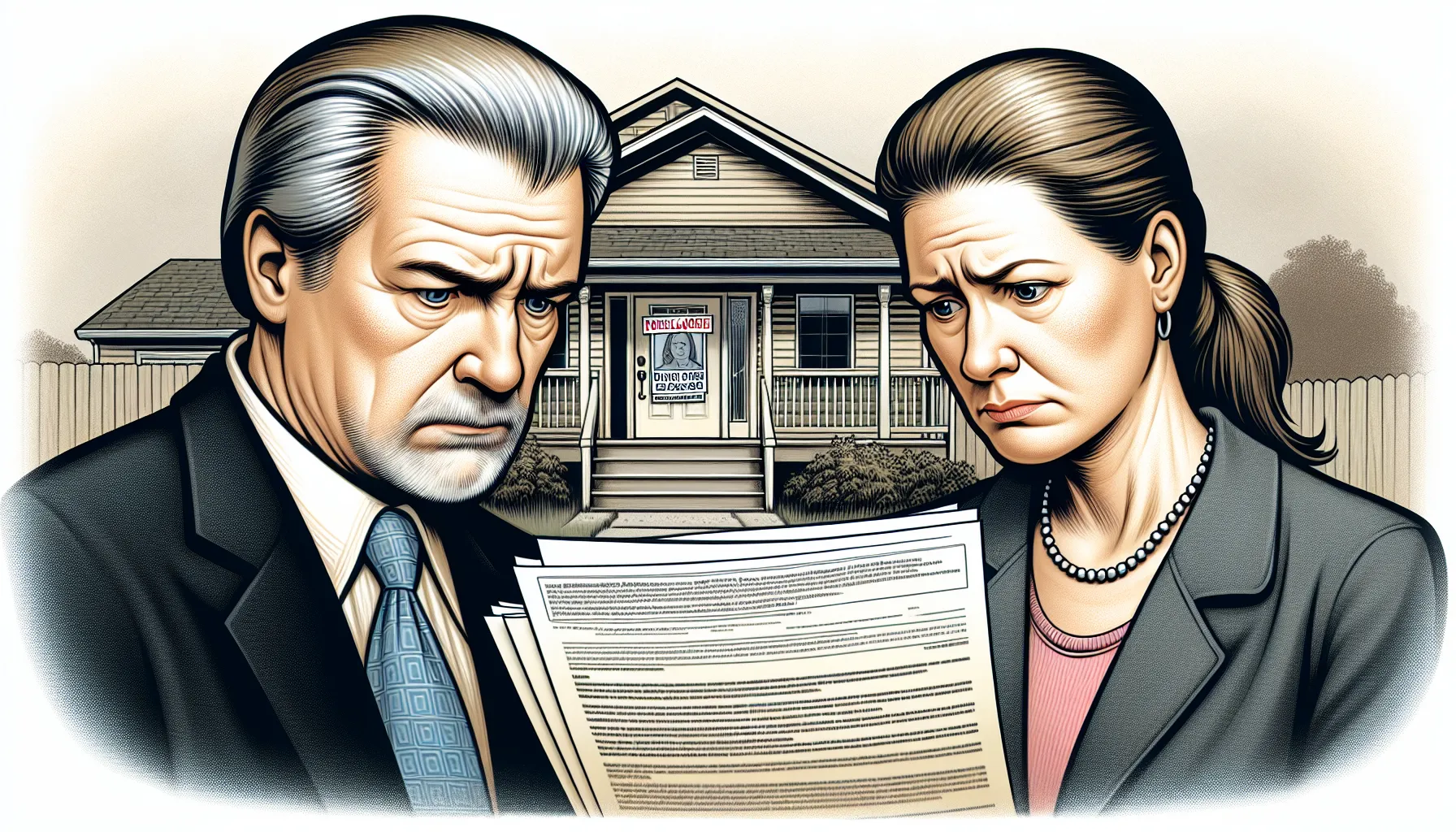Key Takeaways
- Selling your home during foreclosure is possible and may help you avoid severe long-term financial and credit consequences.
- Acting quickly is crucial, as your options narrow as the foreclosure process advances—pre-foreclosure offers the most flexibility for listing and negotiating a sale.
- Open communication with your lender is essential for exploring options like short sales, payoff agreements, or postponing auction dates.
- Legal, financial, and disclosure requirements must be carefully managed; unresolved liens, unpaid taxes, and state-specific laws can affect the sale.
- Working with experienced real estate professionals increases your chances of a successful sale, helps avoid scams, and ensures legal compliance.
- Alternative solutions such as loan modification, forbearance, repayment plans, or deed in lieu of foreclosure may offer additional ways to retain your home or reduce financial impact.
Facing foreclosure can feel overwhelming but we’re not alone if we’re wondering, “Can I sell my home if it’s already in foreclosure?” Many homeowners end up in this situation and aren’t sure what options they have left. The good news is that selling a home during foreclosure is possible and could even help us avoid some of the long-term financial consequences.
Before we make any decisions it’s important to understand how the foreclosure process works and what steps we need to take to sell. With the right information and a clear plan we can move forward with confidence and protect our financial future.
Understanding Foreclosure and Its Implications
Foreclosure initiates when a homeowner defaults on mortgage payments, leading the lender to start a legal process aimed at recovering the outstanding loan by selling the property. This process varies by state but typically advances through pre-foreclosure, foreclosure auction, and, ultimately, bank ownership if the home doesn’t sell. In pre-foreclosure, we might still have time to list the property on the open market, negotiate with the lender, or seek alternatives like a short sale—each scenario comes with its own timeline and procedural requirements.
The implications of foreclosure reach far beyond the immediate threat of losing our home. Foreclosure leads to significant credit score reductions, limits access to future loans, and often triggers IRS tax consequences, particularly if the lender forgives part of the debt as in short sale cases. Actual impacts depend on whether the loan is recourse or non-recourse and how state laws treat deficiency judgments, which means consequences differ in places like California compared to Florida.
Navigating foreclosure requires us to act decisively while understanding buyer scrutiny, disclosure requirements, and competing investor offers common in distressed sales. For example, buyers may request detailed documentation on missed payments or property condition, and state law may obligate us to disclose known defects or legal proceedings tied to the home. When weighing offers, we must consider trade-offs, such as speed versus sale price, or certainty of closing versus exposure to predatory buyers, as high-pressure tactics are not uncommon in foreclosure environments.
Facing foreclosure, even a single decision can influence the outcome—so it’s crucial to understand how the process unfolds, what rights we retain, and where opportunities may exist to regain control or minimize harm.
Can I Sell My Home if It Is Already In Foreclosure?

Selling a home in foreclosure remains a viable option for many owners facing default. Our clients often ask how realistic a sale is once the legal process has started, and understanding the steps creates firmer ground for making practical decisions.
Key Factors to Consider Before Selling
Before putting a foreclosed home on the market, we look closely at legal rights, outstanding loan amounts, and the stage of the foreclosure timeline. Ownership status matters—the window to sell often narrows as the process advances, with most flexibility occurring during pre-foreclosure. Assessing how much is owed versus the property’s current market value sets clear expectations around pricing and proceeds. Issues like title liens, unpaid property taxes, and deferred maintenance affect timing, negotiation, and buyer pool. We also weigh disclosure requirements—federal law (see RESPA) and most state statutes demand sellers inform buyers about foreclosure status and known defects. If a quick sale’s needed, distressed buyers and cash investors represent possible solutions but often involve below-market offers or strict as-is terms. Each variable affects how much control we retain over the outcome.
Communicating With Your Lender
Open, proactive communication with the lender shapes the sales process from start to finish. We contact the mortgage servicer as soon as a sale becomes a consideration—early dialogue creates space to discuss postponing auction dates, agreeing on a short sale, or securing a payoff figure. Short sale approval calls for a hardship letter, supporting documentation, and patience as the bank reviews offers. Title companies and attorneys help verify all outstanding claims so the sale closes cleanly. Delay or lack of transparency from either party introduces risk—predatory buyers may exploit urgency, or foreclosure may proceed faster than anticipated. Lenders sometimes cooperate when a sale promises higher recovery than auction or REO. How we approach lender negotiation often determines not only if, but how well, we exit the foreclosure process. How much risk are we comfortable taking in exchange for a faster resolution?
Steps to Selling a Home in Foreclosure

Navigating a foreclosure sale involves distinct stages, each with its own requirements and stress points. Our experience shows that understanding these steps puts sellers in the best position to regain control and minimize long-term impacts.
Short Sale vs. Traditional Sale
Choosing between a short sale and a traditional sale is often a first and defining decision for homeowners in foreclosure. A traditional sale occurs when the sale price covers the remaining mortgage and related costs, allowing us to transfer title cleanly—this route may be feasible if our home’s market value exceeds what’s owed. With a short sale, our lender agrees to accept less than the outstanding balance, but this requires lender approval and documented hardship, and the process can take several months (HUD reports an average of 90 to 120 days). Lenders typically want a qualified offer and financial documentation before greenlighting a short sale. Additionally, not all lenders respond quickly or favorably, and the IRS may consider forgiven debt as taxable income depending on our state and timing. When values are close or time pressures rise, weighing speed versus financial outcome becomes a central question for many sellers.
Preparing Your Home for Sale
Preparing a home in foreclosure for sale compresses the usual steps and demands a practical approach. Addressing necessary repairs, even modest fixes such as new paint or cleaning, can boost buyer interest and increase our chances of receiving competitive offers. Disclosing all known property defects is not just ethical—it’s required in most jurisdictions and reduces legal risks after closing. Gathering documentation in advance, including loan payoff statements, lien details, and recent tax records, streamlines negotiations and reassures interested buyers or investors. We often advise bringing in a local real estate agent with foreclosure expertise to price accurately in a distressed market and coordinate showings securely, especially if the property remains occupied. Each action we take to enhance transparency and condition positions us more favorably in a competitive and time-sensitive environment. Ultimately, our readiness to act quickly and honestly protects more than just our timelines—it helps preserve trust with all parties involved.
Potential Challenges and How to Overcome Them
Selling a home in foreclosure means facing complex legal, financial, and market realities under time pressure. We navigate these challenges best by anticipating obstacles and acting with clarity—protecting our interests while meeting strict deadlines.
Legal and Financial Considerations
Legal and financial hurdles shape every stage of selling a home in foreclosure. Title issues, for example, can delay sales if unresolved liens or unpaid property taxes exist, which commonly surface during escrow. Lender approval is mandatory for short sales, and most major lenders follow HUD or Fannie Mae timelines, often requiring 30-90 days to review offers. State-specific foreclosure laws, including right-of-redemption periods and notice requirements, can directly impact our sales strategy—Alabama, for instance, permits redemption up to 180 days after the sale, while California’s nonjudicial process offers less post-sale flexibility.
We also weigh immediate financial consequences: late fees, legal costs, and potential deficiency judgments if the sale price falls short of what’s owed. IRS Form 1099-C may trigger tax obligations if debt is forgiven, so we evaluate the Mortgage Forgiveness Debt Relief Act status in our year of sale. Disclosing material defects and foreclosure status to buyers isn’t optional—inaccurate statements invite lawsuits or contract failures. How do we prioritize between paying off debt quickly and maximizing what we keep from the sale? Our approach must balance legal compliance, lender demands, and practical timelines to avoid compounding losses.
Working With Real Estate Professionals
Partnering with experienced real estate professionals introduces critical advantages and essential protections. Agents specializing in foreclosure sales know local statutes, streamline paperwork, and help us avoid predatory “cash buyer” tactics. A licensed agent verifies legitimate offers and mediates with lenders, speeding up short sale approvals and raising our negotiating power with investor buyers. In some states—like Florida or New York—agents also ensure compliance with state-mandated disclosures and coordinate with attorneys on judicial foreclosure filings.
We also gain help setting realistic pricing in line with distressed home comps, managing showings discreetly, and handling sensitive negotiations with tenants or occupants. By sharing our situation candidly with a vetted agent, we improve our odds of postponing auction dates or securing lender extensions if needed. What qualities signal the right partner in high-stakes situations like these? We focus not only on agent credentials but also on their transparency, communication style, and proven success with distressed properties.
Choosing the right guide weighs as much as the listing price, anchoring both our strategy and peace of mind.
Alternatives to Selling During Foreclosure

Exploring alternatives to selling during foreclosure expands our options and sometimes preserves our equity or credit. Loan modification, for example, restructures mortgage terms to create more manageable payments. Our lenders may consider lowering interest rates or extending repayment periods if we demonstrate hardship with supporting documentation. Forbearance agreements temporarily pause or reduce payments, providing brief relief, although full repayment usually follows the forbearance period. These measures help when a short-term crisis disrupts income but an eventual recovery appears likely.
Negotiating a repayment plan can resolve missed payments over time without a sale. We arrange to pay a portion of the overdue balance along with regular installments, avoiding foreclosure if we maintain this schedule. Some homeowners explore government-backed programs like the Home Affordable Modification Program (HAMP), which assists in renegotiating loans or preventing foreclosure in states with higher distress rates.
Deed in lieu of foreclosure offers another route. We voluntarily transfer ownership to the lender, and in some cases, the lender may release us from further mortgage obligations. This option generally leaves a lesser impact on credit than a full foreclosure, though it doesn’t preserve homeownership or equity. Short sale approval may also serve as a tool, letting us sell for less than the mortgage balance with the lender’s consent; the lender then forgives remaining debt, subject to state-specific rules and IRS requirements.
Seeking advice from a HUD-approved housing counselor brings guidance through complex choices, especially when emotions and urgency cloud decision-making. Do we stand to benefit more from relief or long-term ownership? Our circumstances, equity position, and local foreclosure statutes shape what’s practical—or possible—at this junction. Evaluating each path carefully sets the terms for what comes next, anchoring our decision-making in both financial facts and the realities of our local market.
Conclusion
Selling a home in foreclosure isn’t easy but it’s possible with the right approach and support. When we act quickly and stay informed about our rights and options we can take control of a difficult situation and protect our financial future.
Let’s remember that every decision we make now can shape our recovery down the road. By seeking expert advice and moving forward with confidence we give ourselves the best chance to minimize losses and start fresh.
Frequently Asked Questions
Can I sell my home if it’s in foreclosure?
Yes, you can sell your home during foreclosure, especially in the pre-foreclosure stage. Acting quickly gives you the best chance to avoid losing your home through auction and can help minimize damage to your credit score.
What is the difference between pre-foreclosure and foreclosure?
Pre-foreclosure occurs after you miss payments but before the lender officially takes ownership or schedules a foreclosure auction. Foreclosure is the legal process where the lender tries to recover its loan by selling the property.
Do I need my lender’s permission to sell my home in foreclosure?
Yes, especially if you owe more than your home is worth (short sale). Lender approval is required to accept an offer that doesn’t cover the entire mortgage balance.
Will selling my home in foreclosure hurt my credit?
Selling before the foreclosure process is completed generally has less impact on your credit than losing your home at auction, but you may still see your score drop due to missed payments.
What is a short sale?
A short sale occurs when you sell your home for less than the amount owed on the mortgage. The lender must agree to accept the lower amount and forgive the remaining balance.
Should I work with a real estate agent experienced in foreclosures?
Yes, working with an agent experienced in foreclosure sales can help you navigate legal issues, negotiate with lenders, and attract serious buyers.
Are there alternatives to selling my home in foreclosure?
Yes, alternatives include loan modifications, forbearance agreements, repayment plans, or a deed in lieu of foreclosure. These can help you avoid selling and protect your credit.
What happens if my home doesn’t sell before the foreclosure auction?
If your home doesn’t sell before the auction date, it will likely be sold at auction. If it doesn’t sell there, it may become bank-owned (REO property).
What challenges should I expect when selling during foreclosure?
Challenges include tight deadlines, buyer scrutiny, complex paperwork, and legal requirements. Title issues or liens can also complicate the sale.
Can I keep any profit if my home sells for more than what I owe?
Yes, if your home sells for more than your outstanding mortgage and any associated costs, you are entitled to the remaining equity after the lender and other liens are paid off.
Will I face any tax consequences if I sell my home in foreclosure?
Possibly. If your lender forgives part of your debt (as in a short sale), you may owe taxes on the forgiven amount. It’s best to consult a tax professional.



